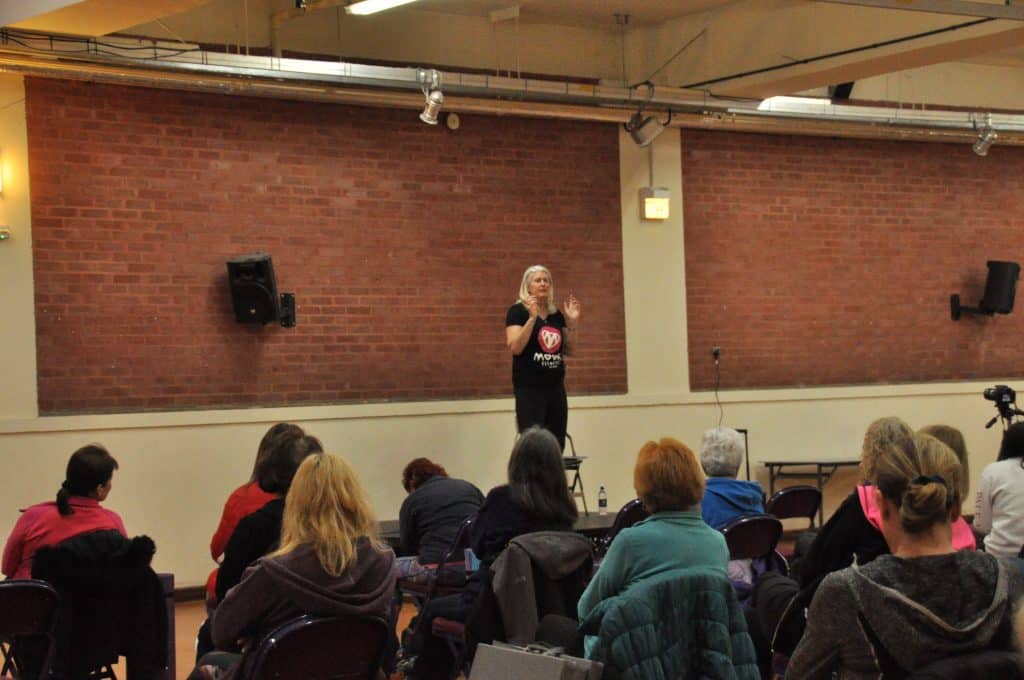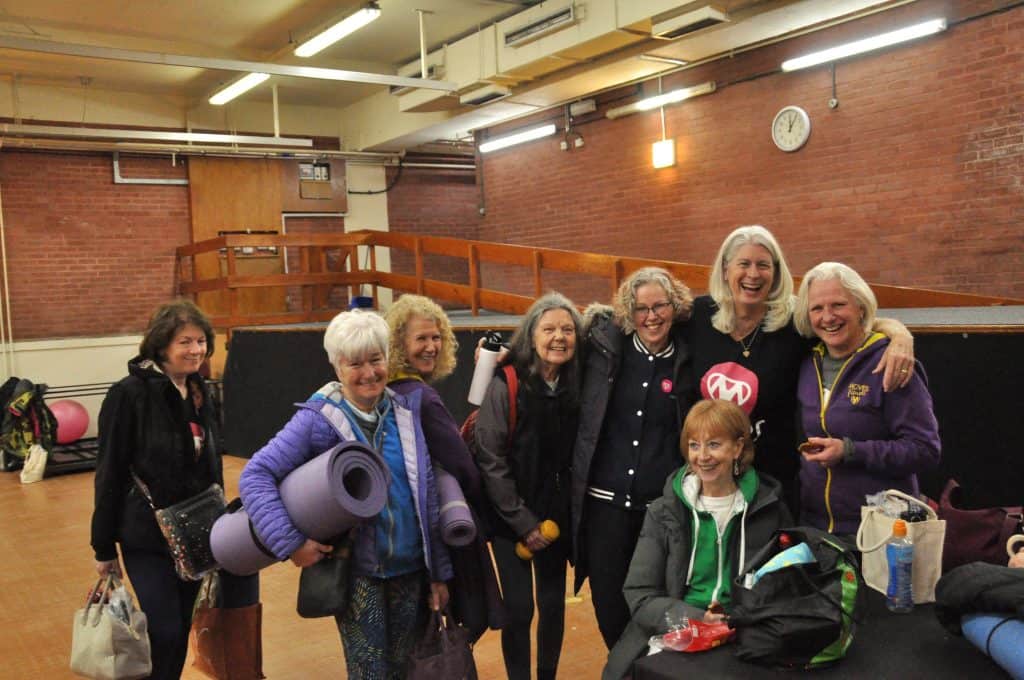Moves Fitness Anti-Aging & Wellness Seminar
Feb 27, 2022 – Cindy Gilbert


In February 2022, Moves Fitness founder Cindy Gilbert hosted an anti-aging and wellness event at the Woking Leisure Centre. During the seminar, Cindy explained how our behavioural choices regarding Sleep, Exercise and Eating affect the aging process and gave cutting-edge, science-based tools to help live a healthier life.
Everyone is welcome to read her notes below:
Key Points:
- All living things are influenced by the timing of the earth’s daily travel around the sun.
- Every cell in our body has a circadian/24 hour “clock” embedded in its DNA which determines the optimal time to perform its function.
- For millions of years the rising and the setting of the sun influenced the timing of these internal clocks
- In the 1930’s electric light became affordable, spreading throughout the world, lighting the night, and affecting how our circadian clocks functioned.
- Research into anti-aging and longevity points to the disruption of our circadian rhythm as the probable cause for many of the stress related illnesses associated with aging.
- Three pillar for extending both lifespan and healthspan are SLEEP, EATING and EXERCISE.
Sleep:
Sleep is complicated. We all know we need it; we’ve all struggled getting enough at times; and now research points to regularly getting 7 to 9 hours of sleep per night as the best anti-aging tool we have at our disposal.
The body’s rhythmic master clock, setting all other cellular clocks, is a bundle of neurons in the hypothalamus called the Suprachiasmatic Nucleus – SNC. It is activated by light. Viewing low horizon sunlight early in the morning stimulates the SNC to release the hormone cortisol which wakes us up, makes us alert, and motivates us to move and get started on the day. This early cortisol release also sets the release time for melatonin, a hormone which induces sleep, for 12 to 14 hours after the first cortisol morning pulse.
It is critical the eyes see low horizon sunlight light and send their electrical message to the central SNC clock early in the morning, so cortisol and melatonin are released properly. Late released cortisol, activated by stressful events or evening lights will inhibit the release of melatonin affecting sleep and instigating a wide range of negative health implications, including cardiovascular health, dementia, learning, depression, fat metabolism and most stress related illnesses.
Tools for Improving Sleep and Setting the Circadian Rhythm:
- Go outside within 2 to 3 hours of sunrise and view low horizon light. Once the sun is high in the sky, the opportunity to set the day’s circadian clock by releasing cortisol has passed. You’ve got one chance and that is early morning.
- In the morning, the goal is to be exposed to10,000 to 50,000 Lux of light. On a sunny day that takes about three minutes to five minutes. If it is heavily overcast, stay outside for 15 to 20 minutes. (Nerd Alert: You can get an App that measures Lux on your phone. I bought Light Meter for one month to get a feeling how much light is 10,000). Note: never look directly at the sun.
- In the evening eyes are more sensitive to light and overhead bright light (kitchen and toilet), blue lights on extension leads, screen light (TV, Computer, phones) can easily signal the SNC to send out pulses of cortisol and inhibiting release of melatonin.
- After sunset dim your lights, avoid overhead lights, use lamps or floor lights, and if viewing computer, phone or television screens you may wish to use blue blockers – glasses that block blue lights.
- CHEAT: Viewing the sunset, outdoor low horizon light in the evening, even for a few minutes informs the body clocks that evening has arrived and lessen some of the effects of viewing bright lights in the evening. Hello. Netflix!
- It takes about 2 to 3 hours for the body to go through its digestive cycle, no matter the amount of food. Do not eat or drink anything 2 to 3 hours before going to bed. (Water & teas without milk or sugar are ok). Digestion not only interferes with signaling the body to sleep, but it also defers many of the important regeneration activities which take place throughout the body during sleep, Among them are fat metabolism, muscle growth and gut/intestinal repair, ATP resynthesis, and learning.
- When you wake up in the middle of the night (usual occurrence) try to avoid turning on overhead lights or thinking about problems without immediate solutions. To avoid irritation/panic/worry about not returning to sleep practice NSDR, Yoga Nidra or pop in ear buds and listen to something that takes your mind off your own thoughts.
References on Sleep:
Huberman Lab:
Master Your Sleep
Can’t Sleep? A Weekend of Camping Could Reset Your Circadian Rhythm, Study Suggests
Dr. Samer Hattar: Timing Your Light, Food, & Exercise for Optimal Sleep, Energy & Mood.
Generation of circadian rhythms in the suprachiasmatic nucleus
Huberman Tool Kit for Sleep
Matt Walker Ted Talk
Book: Matt Walker Sleep
Time Restricted Eating:
Cindy was recently diagnosed with irritable bowel syndrome and decided to see if she could find anything in the recent scientific literature that might suggest a way to reduce the symptoms or treat the root cause.
Her research led her to Dr. Satchin Panda (See Resources).and his work on matching feeding schedules to the body’s DNA cellar circadian clock. Among the benefits listed in his time restricted eating research was the reduction of gut inflammation and IBS symptoms. Cindy used a suggested 8- hour eating window from 10am to 6pm. The results shocked her. She experienced a significant reduction in her IBS symptoms, the loss 10 pounds over a 6 week period and experienced a sense of vitality and drive that seemed to have been a bit resistant to reappearing after Covid. Another fun and unexpected result was a reduction in sugar cravings. Two eating related hormone, Ghrelin, which drives the feelings of being hungry (making biscuits talk from the cupboard) and Leptin which provides the feeling of satiety and fullness are regulated properly as a result of time restricted eating. See How Our Hormone Control Our Hunger
“Similar to how the first sight of morning light resets the brain clock, the first bite of food tells the clocks in our gut, liver, heart, and kidneys to start their day. In many aspects it is not only how much we eat and what we eat, but when we eat that matters, especially for long-term positive health.” The Circadian Code Satchin Panda. PhD, p. 95-97
Tools: How to Achieve Benefits From Time Restricted Eating:
- Note your current eating schedule. Slowly, changing no more than 30 minutes every day or two, shift your eating schedule to begin no sooner than one hour after rising and do not eat or drink anything but water or tea (without milk or sugar) 2 to 3 hours befoe going to bed.
- If fat loss is your goal, adjust your eating time to an 8 hour window and try to keep that 8 hour time frame consistent throughout the week. If you deviate one day, simply go back to your regular schedule the next day.
- One of the advantages of a consistent schedule, is it is common for long held food cravings, particularly sugar cravings, to disappear.
- What to eat in your eating window is up to you, do try to select health unprocessed food choices.(See Dr Lustig’s lecture in Resources) Note: getting your essential fatty acids (Omega 3’s and 6’s) and your essential proteins will trigger the feeling of fullness or satiety.
Reference on Time Restricted Feeding:
Huberman Lab
Fasting for Fat Loss and Health
High-fat diet disrupts behavioral and molecular circadian rhythms in mice
Time-restricted feeding without reducing caloric intake prevents metabolic diseases in mice fed a high-fat diet
Time-restricted Eating for the Prevention and Management of Metabolic Diseases
Does Time-Restricted Eating Really Work Medical News Today Science
10 Evidence-Based Health Benefits of Intermittent Fasting
How to control Ghrelin (hormone that makes biscuits in the cupboard talk)
Does Intermittent Fasting Work?
Book: The Circadian Code by Satchin Panda
Exercise and Healing Our World:
After 41 years in business, we all know that Moves Fitness provides much more than a great exercise class. The community which binds us feels both effortless and unbreakably strong. Friendships develop that would never developed elsewhere. If you are feeling down, lonely, or stressed when walking into a class, you can be sure you will feel uplifted, in contact with friends and empowered when you walk out.
Author Caroline Williams sites the following in her book “Move: How the New Science of Body Movement can set Your Mind Free.”
According to research from the University of Oxford, when we move as one, our brains start to lose the distinction between “us” and “them.” Information about our own movement, from our body, becomes blended with the actions of other people. As a result, the line between self and other becomes blurred. This suggests that moving together could provide an easy way to tackle loneliness and reconnect with people around us. It also provides a way of bringing people together who, on the surface have very little in common or totally opposing world views. Tarr, B., Launay, J., and Dunbar, R. I. M., “Music and social bonding: ‘self-other’ merging and neurohormonal mechanisms, “Frontiers in Psychology, 2014, vol 5: 1096
General: Reference and Related Resources
Books
The Circadian Code by Satchin Panda
The Molecule of More; Daniel Z. Lieberman and Michael E. Long
Move; How New Science of Body Movement can set your Mind Free Caroline Williams,
Podcasts
Huberman Lab 5 Stars!!! Cindy’s favourite
Lifespan Podcast
Harvard Lab Website
Bonus Lecture On Processed Food (related subject of interest)
Dr. Lustig’s lecture : Is a Calorie a Calorie? Processed Food, Experiment Gone Wrong
Relaxation Tools
Trusted Supplement Information:
Some of the benefits of matching sleeping and eating schedules to circadian cycle.
- Longer life
- Ability to handle financial, personal and work-related stress
- Reduction of all memory related dementia illness including Alzheimer’s
- Improved learning, attention, and concentration
- Fat loss
- Reduce blood pressure, lower blood glucose
- Reduces the risk of diabetes
- Maintains and improves organ health including reducing the risk of heart disease and liver disease
- Facilitates muscle repair and growth
- Reduces inflammation
- Revitalizes and boosts the immune system and help recover from illness
- Gut health
- Consistent sleep pattern
